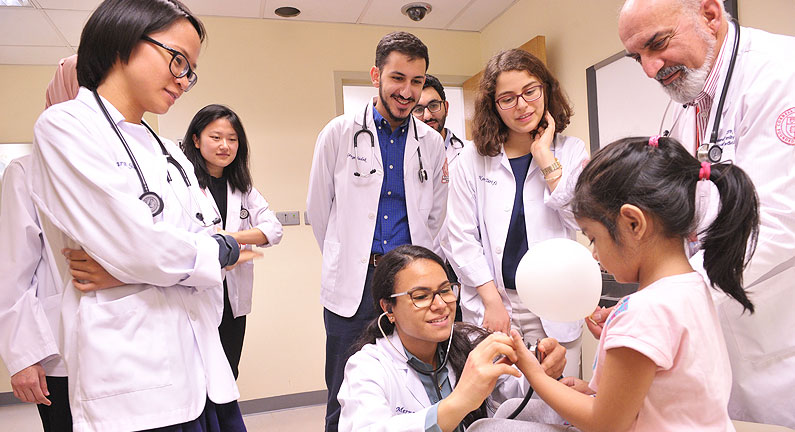Cornell Stars help trainee doctors learn new skills
 The students are shown how to perform a basic physical examination and the creative ways that pediatrician use to soothe the child.
The students are shown how to perform a basic physical examination and the creative ways that pediatrician use to soothe the child.
Medical students at Weill Cornell Medicine-Qatar (WCM-Q) have taken on their toughest challenge to date on the most difficult patients in the world – children.
Each year as part of the Introductory Clerkship Course, WCM-Q holds its Cornell Stars event, where faculty and staff members bring in their own children so that the students can learn the best techniques for examining youngsters while also ensuring they remain relaxed and happy.
Using the mock surgeries at WCM-Q’s state-of-the-art Clinical Skills Center, the students, who are all heading into the third year of the medical curriculum, perform a basic physical examination of the children under the guidance of WCM-Q faculty and doctors from Hamad Medical Corporation, Al Wakra and Sidra Hospitals.
Dr. Amal Khidir, associate professor of pediatrics, and organizer of the Cornell Stars program said the event allowed young children to be educators to teach the medical students at WCM-Q.
Dr. Khidir said: “We are trying to role model what a pediatrician does, the best ways of engaging a child and their family, and how to persuade the child to allow themselves to be examined. We show the students how to perform a basic physical examination and the creative ways that pediatricians use to soothe the child, keep them calm and get them to comply; for example, we might let them listen to their heartbeat with the stethoscope.”
She said that the nature of the examination is opportunistic and that with an adult, physicians would be methodical and go from head to toe, but with children they have to take opportunities when they present themselves. Usually a doctor will start at the heart and lungs of young child and go on to the abdomen, before examining the ears and finally the nose and throat so as to minimize any distress.

Dr. Mai Mahmoud, assistant professor of medicine and director of the Introductory Clerkship Course, added: “The Cornell Stars program is incredibly important to the development and education of our students as fully-rounded doctors I would like to thank all of the parents and children who took part for their valuable support, as well as our colleagues for sharing their time and experience: Dr. Najla Ba Sharahil of Hamad Hospital, Dr. Wail Ali Seleem and Dr. Abdussalam Shah of Al Wakra Hospital, Dr. Sharda Udassi and Dr. Amin Salem from Sidra Medical and Research Center, and Dr. Mohamud Verjee, of WCM-Q.
In all, 45 medical students took part in the Cornell Stars event and it was the first time they had been presented with children as ‘patients’.”
Tala Altaji, who hopes to become a pediatrician following graduation, said: “It was a really lovely experience. It was nice to have hands-on experience with children as it’s something that we haven’t done before – all our clinical work has been with adults so it was interesting to examine a child and make a mental note of what has to be done differently.
“I think with children you have to be very amicable and to get across your message in very simple terms.”
Her classmate Sonia Allouch added: “This was my first time working with children in a clinical setting and it was a really intriguing experience because you have to use a different set of skills and a different approach to when you examine an adult. We examined a little girl who was only ten months old and we manage to keep her calm by keeping her close to her mother as much as possible, speaking softly and making it a playful experience for her.”